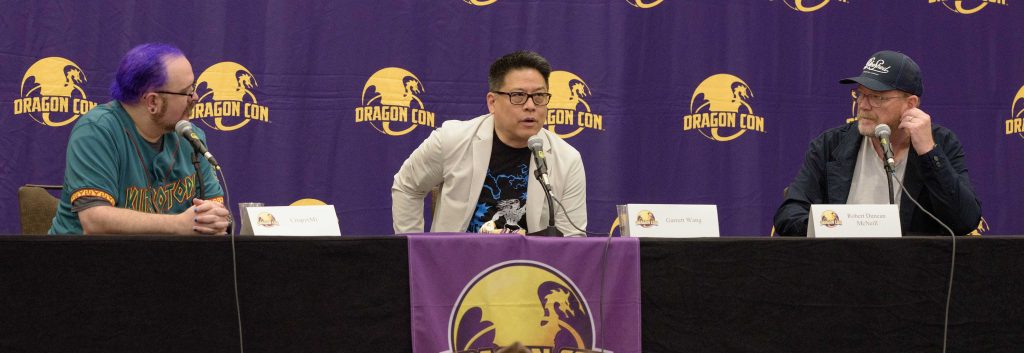Normally Trek Track director Garett Wang moderates actor panels but Friday afternoon in the Marriott Imperial Ballroom, the tables were turned as Wang assumed the role of panelist. Crispy moderated this session, dedicated to all things Star Trek: Voyager. Joining Wang on the stage was his partner from the series, and podcast co-host, Robert Duncan McNeill. Wang considers the two of them among the greatest of Star Trek duos, and it was interesting to see the way they interacted. In many ways Wang, with lots of Dragon Con experience, allowed McNeill (a first time Dragon Con guest) to have the stage.

Crispy launched the conversation by asking about the notion of “nerding out.” For McNeill, nerding out is a catch phrase for finding something you’re passionate about the taking the “deep dive” into it. McNeill, who grew up in Atlanta, has carried on a lifelong love affair with motorcycles. As a kid he had neighbors in Atlanta who owned minibikes, and he used to join them (despite his mother’s orders not to) on biking excursions in the woods. Ever since, he’s loved two-wheeled vehicles. He pointed out that he just finished reading Robert Pirsig’s 1974 Zen and the Art of Motorcycle Maintenance, in which a father-son duo journey cross country via motorcycle. The work is fundamentally one that mixes philosophy, spirituality, Zen Buddhism, and motorcycle maintenance into a reflection on caring. McNeill was taken by the notion of “caring about care” which he described as an investment of oneself into an experience. This constitutes, to him, the essence of “nerding” out.
Wang pointed out that he had a deep respect for McNeill’s commitment and hard work supporting a family while building a career. After Star Trek: Voyager, McNeill moved into directing. Wang stayed in touch with McNeill but knew their schedules didn’t allow them much time together. Then COVID struck and the world shut down. Wang had an idea for a podcast in which he would examine and comment upon every episode of the series. He knew the natural partner for such an endeavor would be his old comrade and friend, Robert Duncan McNeill. He hesitated, knowing how busy McNeill was, until his partner declared “the world has stopped… he’s not busy.” The rest is podcast history. The Delta Flyers, now with 274 episodes, is a phenomenon unto itself. Each week, Wang and McNeill discuss an episode of the TV series. Their format: introduce the episode, provide a synopsis in the form of poetry, watch the episode, and then come back to discuss it. Their fans follow along and the community rewatches the series together. This has become the go-to guide to the series as Wang and McNeill have brought not only their fellow actors onto episodes, but off camera artists and staff as well. It is, in Wang’s words, “the ultimate documentary” of Star Trek: Voyager.
A member asked the duo about managing the pressure that comes with being a part of the Star Trek franchise. Wang, who enjoyed the original series, didn’t feel the weight of being a part of Star Trek: The Next Generation’s successor series. He had very little exposure to it in part because every time he tried to watch the landmark series, he landed on a rerun of the same episode: “Code of Honor.” Wang hated the episode and to this day considers it one of the worst in all of Star Trek. He assumed that three failed attempts to watch an episode other than “Code of Honor” surely meant that it was not meant to be. So, he stopped trying. He sees that as truly fortuitous because if he had watched Star Trek: The Next Generation it would have influenced the way he played “Harry Kim.” For McNeill, the pressure was all about doing a good job, having a regular salary for seven years and making sure he didn’t “screw it up!” The Star Trek: Voyager actor who knew of and felt the weight of the franchise was Tim Russ, who played the Vulcan “Tuvok.”
Wang and McNeill have been a duo since 1994. It’s a strong bond. Their hour together Friday afternoon showed the depth of their connection and chemistry. It was a joy to see.
